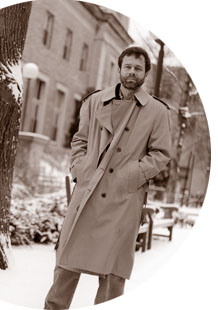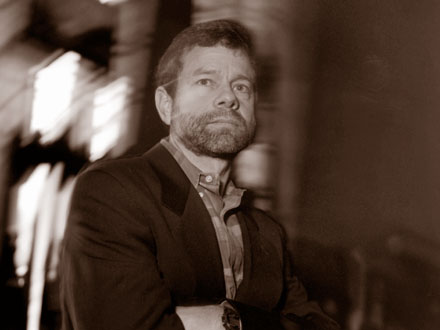Spring 1999
![]()
Soundings is a publication of the School
of Humanities and Social Science
at MIT
Editor:
Orna
Feldman
Editorial Assistance:
Sue
Mannett
Elisabeth Stark
Layout and Art Direction:
Conquest
Design
Layout and Art Direction:
MIT
Publishing Services Bureau
"Both kinds of thinking"—the rational and the intuitive"—produce an interesting tension, and that creative tension has been the force in my own writing."
Writer and physicist Alan Lightman, at the juncture of science and art.
Creative tensions
Alan Lightman is the John E. Burchard Professor of Humanities and senior lecturer in physics. He is the author of two novels, three collections of essays and six non-fiction books on science. His 1993 bestseller, Einstein's Dreams, was the 1994 PEN New England Award runner-up and Origins garnered the 1990 Association of American Publishers' Award. Lightman was elected fellow of the American Academy of Arts and Sciences (1996) and the American Association for the Advancement of Science (1989) and named a Boston Literary Light (1995). From 1991 to 1997 he headed MIT's Program in Writing and Humanistic Studies. Prior to arriving at MIT in 1989, Lightman was a research scientist at the Harvard-Smithsonian Center for Astrophysics.
You've spoken in the past about the tension
between rationality and intuition. What interests you about the intersection
of these two modes of understanding?
I have been very interested in both the arts and the sciences since a young age, when I felt a social pressure to go in one direction or the other. I wrote poetry and also built rockets. But as I got older, in college and after, I arrived at a broader appreciation that the rational and the intuitive are two different ways of looking at the world. They both have their realms of validity and they're both necessary. Scientists try to work only on what they call well-posed questions, those with a definite answer. They don't spend time on questions like, "Does God exist?" and "What is love?" But there are many different kinds of questions with many or no answers worth thinking about. Both kinds of thinking are important and produce an interesting tension, and that creative tension has been the force in my own writing.
Is the intuitive necessary to be a good scientist?
I believe it is, though it's hard to describe what intuition is. It's not following equations or results in a linear, step-by-step manner. It's somehow seeing the whole, seeing the way different pieces fit together. Aesthetic judgment, the sense of beauty, often plays a role in the work of the great scientists. One of the most famous cases is Paul Dirac, a physicist who discovered, around 1930, an equation that combines both relativity and quantum physics in the description of the electron. He was guided by the beauty and elegance of the mathematics, not by doing experiments. An inner voice told him when he was on the right track. The surprising result of the equation, for which he won the Nobel Prize, described the existence of a previously unknown particle—later called the positron. A few years later, the positron was discovered experimentally. It's a wonderful example of how aesthetic principles can guide us to the truth of nature.
How about in your own life as a scientist?
I have occasionally worked on scientific problems and beat my head against the wall for months, unable to solve them by following one equation to the next. And then in the shower or taking a walk, suddenly I would have a vision of the whole thing and of my error. This has happened a few times in my life and it's one of the greatest thrills there is. It's a thrill in which you lose all sense of ego. And you become a seer, you're just pure seeing. It's a similar thrill I have had as a writer when I see how to do something or understand something in a character.
Why is it important for you to bring science to literature?
If we're speaking of non-fiction writing, I think science is fascinating subject matter. For many people, science is a foreign culture, like writing about India for an American. As a subject for fiction, what you want to do is give the readers an emotional experience, to change them somehow in an emotional way. And science is really no different than any other subject for giving the reader that emotional experience.
 Who
are your literary mentors?
Who
are your literary mentors?
In the early and mid-70s, Lewis Thomas and Stephen J. Gould began writing essays. I was very impressed that scientists could and would write for the public. At that time there was a taboo against working scientists spending time writing for the public, an activity considered kind of fluffy. It was not productive, didn't really communicate results to other scientists and didn't lead to new science. It was, I use the word guardedly, almost feminine, with science having a masculine image.
Was the transition from non-fiction to fiction writing difficult for you?
Yes. It was, but it didn't happen all at once. I started writing essays in the early 1980s, long before I started my first novel. But some of these essays crossed the line from non-fiction into fiction and some actually were almost short stories. Most involved science in some way, but sometimes only as a mist in the background. So I had experimented with fiction through stretching the essay, which is a very forgiving and flexible genre, allowing one to be philosophical or informative, factual, personal.
Was it an act of courage to move to fiction writing?
There was a certain amount of courage involved, although I wouldn't want to present myself as a hero here. But I did feel much more secure in the world of science. By this time I had been successful as a scientist, I had an assistant professorship at Harvard in astronomy so I was definitely established and felt that that's where a lot of my identity was. I was also concerned about how my scientific colleagues would react, whether they would still consider me as a member of the club or whether I would now be one of these flakes. But my scientific colleagues, in fact, reacted with great generosity. Of course, I have now entered a second community, the community of writers.
How did it feel to leave the club?
I was sad. I felt I had lost my community and the thrill of frontline research, where you discover a new result, late at night, in your study, working with pencil and paper, alone. And for a while no one else in the world knows this new thing you have learned. It's the greatest thrill there is. Then the next week you begin telling your colleagues about it and they get excited. Another factor in my career change was that most physicists do their best work when they're in their mid-30s and after that they're declining.
You mean their brain cells are diminishing?
There is a certain agility of mind in science that favors younger people. As scientists get in their mid-30s and beyond they start doing administrative things, writing textbooks, serving on committees. A greater and greater percentage of their time is spent doing non-research.
That small window seems terrorizing.
It is, and it certainly frightened me. You look at the Nobel Prizes won in theoretical physics, for example; most of them are won for work when the individuals were 35 or less. And with mathematics it's even younger. I could see very clearly my own limitations as a scientist. Whereas as a writer I feel like that kind of agility of mind is not so important. The accumulation of life experiences is more important.
What prompted you to leave Harvard to come to MIT?
It was a major move. MIT is a place that really encourages interdisciplinary work and interdisciplinary thinking. As compartmentalized as MIT seems, it does have a generosity of attitude about creativity. It's a very entrepreneurial kind of attitude—you don't have to be steeped in tradition at MIT, you just have to have a good idea and MIT will support you. That attitude, along with being jointly in the Physics Department and in the Writing Program, was an offer I couldn't refuse.
Let's talk about your teaching. Is it possible to teach writing?
Well if I said no, I would be out of a job. I think it's possible up to a point. You can get students to read good writing, practice writing, think about their writing and you can provide them with feedback on their writing. So students find out from other people whether something is working or not working in their writing and that's useful. But teaching can't tell you what that magical thing is in a piece of writing that makes it great and teaching can't give it to you.
Does the scientific focus of MIT students inhibit their writing?
It does in some ways. Many MIT students have not read a lot, so they're unsophisticated when it comes to the possibilities in literature. And because they have been focused on science and a totally rational way of approaching the world, some are not comfortable with expressing their emotions. It's a challenge to get their emotions out of them. But I think it's so important to make them comfortable with expressing their emotional lives. That's just as important as getting them to be graceful writers or teaching them about grammar, different parts of a story or character development.
Tell me about your upcoming novel (to be published in 2000).
The title is The Diagnosis. It's about a middle-aged business man who goes to work one morning and begins suffering from a mysterious illness. Most of the book is spent with his getting more and more ill and trying to get a diagnosis. The larger view is a portrait of the American obsession with speed, efficiency, information and money and what this mode of life has done to our minds and our spirits.
You once said that being a physicist was not so important as being an explorer. What does it mean to you to be an explorer?
For me, exploration is tied to creation. I want to create. That's the way I want to live in the world. I want to really live life, to know what life is and to make something that wasn't there before. I now feel I could not be satisfied if I didn't write, it is something I have to do. It's what brings me the most pleasure. At bottom, I want to change the world in big ways as well as small ways, which is one of the reasons I write. I'm very ambitious that way. I don't want political power or administrative power. The kind of power I want is to change people's minds and thoughts.
![]()
Copyright © 2000 Massachusetts
Institute of Technology

